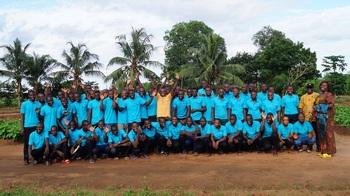Context
Almost two thirds of all gainfully employed Africans work in the continent’s agricultural sector. The majority of the workforce are smallholder farmers without any formal or informal training. Agriculture is the only source of income for many families in rural areas. Moreover, the agricultural sector accounts for an above-average share of Africa's gross domestic product (GDP).
The Comprehensive Africa Agriculture Development Programme (CAADP) has been the framework for action for agricultural transformation on the continent since 2003. The programme is an initiative by the African Union (AU) and supports the member states in increasing investment and productivity in the agricultural sector. It aims to achieve agricultural growth rates of more than 6 per cent in order to promote food security and economic development in Africa.
In many African countries, however, the agricultural sector has not been sufficiently modernised to help reduce poverty and boost economic growth. Farmers lack the necessary skills, qualifications and access to training to professionalise and expand agricultural production, processing and marketing.
Objective
Sustainable agricultural training and vocational education are firmly established in the structures and processes of the CAADP in selected countries.


